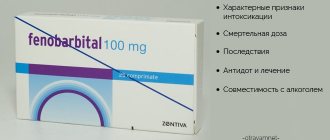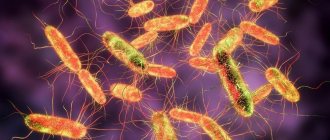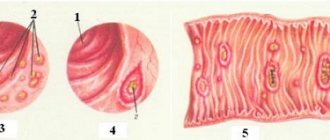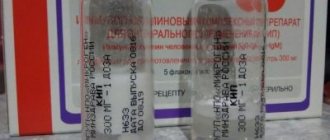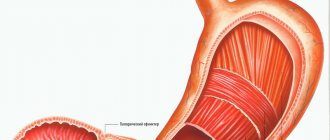Usually, many people take food poisoning lightly, believing that soon everything will go away on its own, without any consequences for the body. However, undiagnosed rotavirus infection, which has many symptoms similar to poisoning, even with a high level of medical development, can lead to death. You can distinguish rotavirus from poisoning by familiarizing yourself with the theory of the issue, the main symptoms, features and differences in the treatment of these diseases.
The main motivating reason for learning to distinguish poisoning from rotavirus is the severity of the manifestations of the latter:
- rapid and acute development of the disease;
- the likelihood of death due to severe dehydration, especially in children under 3 years of age.
What factors provoke the development of pathology?
The causes of rotavirus infection include:
- Eating food that has not been sufficiently cooked
- Pathogens can be present in water and air.
- Infection occurs through contact with a person who is a carrier of the virus.
Expert opinion
Tsareva Nadezhda
General practitioner, hepatologist, site expert
Rotavirus infection instantly spreads in schools, kindergartens and shopping centers. The risk group includes people with weakened immune systems.
There are several factors that cause poisoning:
- Pathogenic microorganisms may be present in low-quality food products.
- When purchasing a product, you need to pay attention to the expiration date. Products are often stored in violation of sanitary standards.
- Contact with toxic substances can cause severe poisoning.
| Matching signs | |
| Rotavirus | Poisoning |
| In both cases, patients experience attacks of vomiting and nausea. | |
| Patients complain of loose stools and abdominal pain. | |
| Increased frequency of bowel movements leads to rapid dehydration of the body. | |
| Patients experience dry mouth and increased heart rate. | |
| The person experiences fatigue and drowsiness. | |
| An increase in temperature can be a sign not only of a viral infection, but also of severe poisoning. | |
| Features | ||
| Factor | Rotavirus | Poisoning |
| Cause | The source of infection is a sick person. | Indigestion occurs due to harmful bacteria that are present in the esophagus. Moreover, poisoning may be associated with the ingestion of toxic substances. |
| Length of incubation period | In most patients, the first signs of the disease appear within 2 days. | Symptoms of poisoning occur within 24 hours after eating low-quality food. The patient begins to complain of rumbling in the stomach and attacks of nausea. |
| Duration of treatment for the disease | You can get rid of a viral infection within 3-7 days. | To restore the body after poisoning, you must take medications for 5 days. |
| Is it possible for the pathology to reoccur? | A person who has had a rotavirus infection acquires immunity to the causative agent of the disease. | If harmful bacteria enter the body, the patient risks ending up in the hospital again. |
| Symptoms | After being infected with rotavirus infection, the patient develops the following symptoms:
| There are several signs characteristic of poisoning:
|
Question: What is the difference between food infections and food poisoning?
The site provides reference information for informational purposes only. Diagnosis and treatment of diseases must be carried out under the supervision of a specialist. All drugs have contraindications. Consultation with a specialist is required!
What is the difference between foodborne infections and food poisoning?
The clinical signs of food poisoning and foodborne illness are very similar; When establishing a diagnosis, questioning the patient and laboratory tests are of great importance. Without this, it is difficult even for an experienced doctor to establish the correct diagnosis.
What are the differences between food poisoning and food (intestinal) infections?
- Food poisoning is not a contagious disease, but intestinal infections are transmitted from a sick person to a healthy one.
- Food poisoning occurs only when eating poor quality foods. Intestinal infections can be transmitted both through food and through water, soil, and household items.
- The incubation (latent) period for food poisoning is short: from half an hour to 24 hours. For intestinal infections, this period is longer: from 2-3 days to several weeks.
- Food poisoning is characterized by widespread and simultaneous illness of people who ate the same food; This is not observed in foodborne infections.
- The duration of the disease for food poisoning is on average 1-3 days, and for intestinal infections - from one to several weeks.
How to distinguish poisoning from an intestinal infection? Diseases have similar symptoms, so it is difficult for a person far from medicine to understand which disease has manifested itself. Doctors distinguish infections and poisonings by specific signs and test results. Not all medications that are effective against poisoning can help treat infections caused by bacteria, viruses and other toxin-producing microorganisms. Taking certain medications can worsen the disease.
Symptoms and distinctive signs of the disease
There are several factors that can help determine the cause of the disease. Infection with intestinal flu is accompanied by several symptoms:
- The patient develops a fever that does not go away for several days. Taking antipyretics does not bring any results.
- Rotavirus infection poses a danger to others. Patients begin to complain of redness of the throat and coughing attacks.
- Patients suffer from severe headaches.
- Reproduction of the infection causes digestive upset. At the same time, the patient's stool frequency and consistency of discharge changes.
- The development of pathology is indicated by darkening of the color of urine.
Expert opinion
Tsareva Nadezhda
General practitioner, hepatologist, site expert
The infection spreads quite quickly among other family members. By this sign, you can quickly distinguish cases of rotavirus infection.
When poisoned, a person experiences the following symptoms:
- To get rid of toxins, bowel movements become more frequent.
- The patient begins to experience muscle spasms.
- The patient experiences pain in the abdomen.
- People with poisoning complain of bitterness in the mouth and loss of appetite.
How to protect yourself from rotavirus?
It is easier to prevent a disease than to treat it later. Of course, this is difficult to do with rotavirus, but it is possible. It is important to follow the following recommendations:
- Strictly observe hygiene standards, both at home and at work. Vaccinate them in children.
- You can get vaccinated against rotavirus.
- If a sick person appears at home, he should be isolated from others to prevent the spread of infection.
The doctor will tell you how to disinfect the room where the sick person was.
Diagnostic methods
Several methods are used to prolong the cause of the disease.
Analysis of urine
Experts pay attention to the increase in the number of proteins and leukocytes. A sharp increase indicates a person is infected with rotavirus infection. The patient's urine smells like ammonia.
Stool analysis
The discharge contains impurities of blood and mucus. In the process of bacteriological examination, specialists identify the type of pathogen.
ELISA – enzyme immunoassay
An infected person begins to secrete antibodies, which are detected using a special enzyme. During their interaction, the solution becomes colored, which shows the degree of damage to the body.
Bacteriological studies
If poisoning is suspected, the doctor takes samples from the stool, which are sent to the laboratory. After studying the samples, the type of harmful bacteria that has affected the patient’s gastrointestinal tract is determined.
Differences in treatment
The main difference in the treatment of intestinal infection and food poisoning is the need for antibiotic therapy. With laboratory confirmation of the bacterial etiology of the disease, the doctor prescribes antibacterial drugs, which the patient should take strictly according to the schedule.
Please note that viral intestinal infections are treated in the same way as food poisoning. Antibiotics or antiviral drugs are not prescribed.
The remaining components of the treatment are almost the same. Diet, drinking plenty of fluids, antispasmodics, enzymes, antiemetics - all this helps the patient recover faster .
It is worth noting that in case of poisoning by poisonous mushrooms, the patient may need hemodialysis - purification of the blood from poisons using an artificial kidney apparatus.
Poisoning and intestinal infections have many similarities and differences. Only an experienced doctor can make an accurate diagnosis after examining, collecting an anamnesis and examining the patient. Treatment is prescribed by a doctor after identifying the cause of the disease. Antibiotics help with intestinal infections. You cannot prescribe them for yourself; you can take them only on the recommendation of a doctor.
Drugs used to kill rotavirus infection
You can cope with pathogenic microorganisms using:
- Enterosgel , which accelerates the removal of toxins from the body.
- Enterofuril , which belongs to the group of intestinal antiseptics. The product prevents the proliferation of the pathogen and reduces irritation of the intestinal walls.
- Enterol , which actively suppresses the reproduction of the virus. Thanks to the drug, the patient’s body is cleansed of toxins, immune cells are activated, and the drug also helps fight dehydration, as it retains fluid in the body.
- Linex, Bifidumbacterin - to restore intestinal microflora
- Cycloferon - to treat infection
- Ingavirin - suppresses the proliferation of pathogenic microflora. After taking the drug, the immune system is activated in patients
Prevention
You can prevent poisoning or infection by following these rules:
- It is necessary to exclude contact with infected people and contaminated household items.
- You need to wash your hands before every meal, after visiting the toilet and public places.
- Do not eat unwashed fruits and vegetables or expired food.
- It is recommended to take vitamin preparations that strengthen the immune system.
- Chronic diseases of the digestive system must be eliminated in a timely manner.
The peak incidence of intestinal infections occurs in the summer. During this period, hygiene must be observed especially carefully.
Features of nursing
Patients with gastroenteritis of any origin require observation and monitoring of their condition. You need to give them more liquid - still mineral water, weak tea, dried fruit compote without berries, jelly. Until the vomiting stops, complete hunger is indicated. During the recovery period, a gentle diet is prescribed, excluding fried, smoked, spicy, and fatty foods. All dishes are served in crushed form.
In case of rotavirus infection, dairy products are prohibited, as secondary lactase deficiency develops against this background.
A patient with rotavirus infection must have a separate towel and utensils. The room must be regularly wet cleaned and ventilated.
Traditional methods
With a mild form of this disease, it is not necessary to purchase medications. You can use traditional methods of treatment, which also work well:
- To prevent dehydration, you need to drink a saline solution. To prepare it, you need to dilute 1 tsp in a liter of boiled water. salt, 2 tbsp. l. sugar and 1 tsp. soda Then you should induce vomiting and drink another glass. Do this several times. You need to drink 2 liters of this solution per day.
- If your temperature rises slightly, you should drink warm chamomile tea several times a day. To prepare the drink, brew a teaspoon of dry chamomile with one glass of boiling water, strain after 15 minutes. To prevent vomiting again, you should take 1 tbsp of this drink. l. every five minutes until the glass is empty.
- To restore stool during diarrhea, you can drink a starch solution. It is necessary to dilute 1 tbsp in a glass of warm water. l. starch.
- For symptoms of conjunctivitis that occur with a viral infection, you should wash your eyes with brewed black tea several times a day.
- You can restore your stomach with dill water. To prepare it, you need to steam the ground dill seeds at the rate of 1 tsp. products for 200 ml of water. Then strain the medicine and drink 3 times a day before meals.
To restore the intestinal microflora, you should consume low-fat fermented milk products, but you need to introduce them into the diet with caution: 1 tbsp. l. in a day.
Video: food poisoning or infection?




